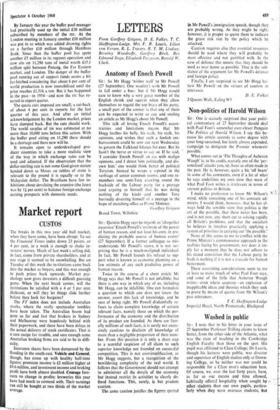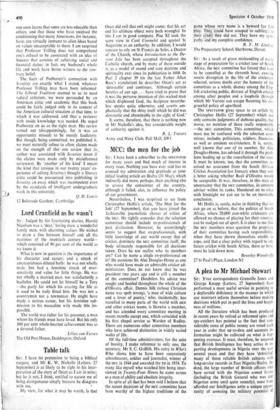Washed in public
Sir : I note that in his letter in your issue of 27 September Professor Trilling claims to know better, from the other side of the Atlantic, what was the state of teaching in the Cambridge English Faculty than those on the spot. His pupil was affiliated to Clare College; Dr Leavis, though his lectures were public, was director and supervisor of English studies only at Down- ing College, so he neither was nor could be responsible for a Clare man's education here. Of course, we, over the last forty years, have, as far as our means and time allowed, habitually offered hospitality when sought by other students than our own pupils, particu- larly when they were overseas students; but one soon learns that some are less educable than others, and that those who have 'received the conditioning that many Americans, for instance, have, are virtually immune to alien ideas based on values unacceptable to them. I am surprised that Professor Trilling does not comprehend one's refusal to be associated with an idea of Success that consists of achieving social and financial status; in fact, my husband's whole life and work have borne witness to the con- trary belief.
The facts of Podhoretz's connection with Scrutiny are exactly what I stated, whatever Professor Trilling may have been informed. The Liberal Tradition seemed to us to need radical criticism; we were persuaded by an American critic and academic that this book could be fairly judged only in its context of the American cultural situation at that time, to which it was addressed, and that a reviewer with inside knowledge was needed. He urged Podhoretz on us as the right man. His review turned out (disappointingly, for it was an opportunity missed) to be merely laudatory. But though, being committed, we published it, we must naturally refuse to allow. claims made - on the strength of this one review that its author was associated with Scrutiny (even if the claims were made only by misinformed reviewers). By 'another of his kind' I meant the kind that (unique in our twenty years' ex- perience of editing Scrutiny) thought a literary critic could be pressurised into publishing in Scrutiny an essay which was incompetent even by the standards of intelligent undergraduate work in this university.
12 Bulstrode Gardens, Cambridge Q. D. Leavis







































 Previous page
Previous page